I am programming a simple perceptron in matlab but it is not converging and I can't figure out why.
The goal is to binary classify 2D points.
%P1 Generate a dataset of two-dimensional points, and choose a random line in
%the plane as your target function f, where one side of the line maps to +1 and
%the other side to -1. Let the inputs xn 2 R2 be random points in the plane,
%and evaluate the target function f on each xn to get the corresponding output
%yn = f(xn).
clear all;
clc
clear
n = 20;
inputSize = 2; %number of inputs
dataset = generateRandom2DPointsDataset(n)';
[f , m , b] = targetFunction();
signs = classify(dataset,m,b);
weights=ones(1,2)*0.1;
threshold = 0;
fprintf('weights before:%d,%d\n',weights);
mistakes = 1;
numIterations = 0;
figure;
plotpv(dataset',(signs+1)/2);%mapping signs from -1:1 to 0:1 in order to use plotpv
hold on;
line(f(1,:),f(2,:));
pause(1)
while true
mistakes = 0;
for i = 1:n
if dataset(i,:)*weights' > threshold
result = 1;
else
result = -1;
end
error = signs(i) - result;
if error ~= 0
mistakes = mistakes + 1;
for j = 1:inputSize
weights(j) = weights(j) + error*dataset(i,j);
end
end
numIterations = numIterations + 1
end
if mistakes == 0
break
end
end
fprintf('weights after:%d,%d\n',weights);
random points and signs are fine since plotpv is working well

The code is based on that http://es.mathworks.com/matlabcentral/fileexchange/32949-a-perceptron-learns-to-perform-a-binary-nand-function?focused=5200056&tab=function.
When I pause the infinite loop, this is the status of my vairables:

I am not able to see why it is not converging.
Additional code( it is fine, just to avoid answers asking for that )
function [f,m,b] = targetFunction()
f = rand(2,2);
f(1,1) = 0;
f(1,2) = 1;
m = (f(2,2) - f(2,1));
b = f(2,1);
end
function dataset = generateRandom2DPointsDataset(n)
dataset = rand(2,n);
end
function values = classify(dataset,m,b)
for i=1:size(dataset,1)
y = m*dataset(i,1) + b;
if dataset(i,2) >= y, values(i) = 1;
else values(i) = -1;
end
end
end